Recognizing a Hero
By Patty Gelb
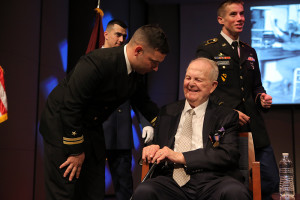 It took over 70 years for The University of Toledo alumnus, professor emeritus and Army veteran, Dr. Richard Perry
It took over 70 years for The University of Toledo alumnus, professor emeritus and Army veteran, Dr. Richard Perry
(’48, ’50, ’64), to receive the Soldier’s Medal designated for him on August 29, 1945 for his heroic acts during World War II. The Soldier’s Medal is an important recognition in the Army and is awarded for distinguishing oneself by heroism not involving actual conflict with an enemy. Until very recently, Perry wasn’t even aware he had earned this honor.
A series of lucky events, followed by the desire of the director of the UT Military and Veteran Affairs department to ensure this hero was recognized, culminated in Perry’s knowledge of his award and a celebration at UT on Nov. 5 where he was pinned with his long overdue medal.
“It was a twist of fate that he found out about it and another twist of fate that UT’s Army Reserve Officer Training Corps called our office where I happened to pick up the phone,” said Lt Haraz N. Ghanbari, USNR, director, Division of Military and Veterans Affairs.
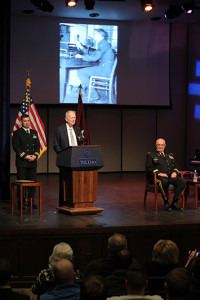 Perry, now 89 years old, was with the 63rd Infantry Division during WWII. In April of 1945, an ammunition explosion in Germany injured two American soldiers. It was then that Sgt. Perry ran into an inferno to rescue the soldiers. He then went back to the rubble to remove unexploded ammunition before a grenade went off and he was injured.
Perry, now 89 years old, was with the 63rd Infantry Division during WWII. In April of 1945, an ammunition explosion in Germany injured two American soldiers. It was then that Sgt. Perry ran into an inferno to rescue the soldiers. He then went back to the rubble to remove unexploded ammunition before a grenade went off and he was injured.
When Perry woke up in the hospital, he found he had been awarded the Purple Heart and the Bronze Star. He did not have the paperwork for the medals and did not know at the time that he had also been awarded the Soldier’s Medal. Following the completion of his military service, Sgt. Perry was honorably discharged with some of the highest honors that can be bestowed by the military.
After the war, this Waite High School graduate came back to Toledo to obtain his bachelor’s, master’s and doctoral degrees from The University of Toledo. An accomplished academic, Perry spent over 57 years teaching and holding various administrative positions at the University.
It took technology, and the time to research, that started the chain of events that led to his awareness of the award that he should have received during the war.
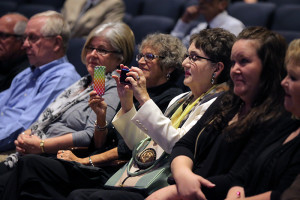 One day, Perry and his wife, Barbara Rondelli Perry, were searching online to find information about his former Army unit. Through their research, they found a retired Army colonel who was the unit’s historian and held many records of the unit from the war. The historian cross checked the rosters, found Perry’s records and informed him that he had copies of the morning reports, promotion reports and even the general order for the Soldier’s Medal. This was the first time Perry heard mention of this award.
One day, Perry and his wife, Barbara Rondelli Perry, were searching online to find information about his former Army unit. Through their research, they found a retired Army colonel who was the unit’s historian and held many records of the unit from the war. The historian cross checked the rosters, found Perry’s records and informed him that he had copies of the morning reports, promotion reports and even the general order for the Soldier’s Medal. This was the first time Perry heard mention of this award.
Not fully knowing what the Soldier’s Medal was or meant, Perry reached out to the University’s ROTC group who led him to the Division of Military and Veterans Affairs. Ghanbari went to meet with Richard and Barbara in the Perry home and quickly learned that not only did the Perry’s not know about the Soldier’s Medal, they did not have the certificates and documentation that accompanied his Purple Heart and Bronze Star. He also had the wrong Bronze Star displayed in his shadow box in his home. The one that he had did not include the oak leaf clusters denoting that it was for multiple awards and it did not have the “V” symbol on the ribbon that signified that it was awarded for Valor.
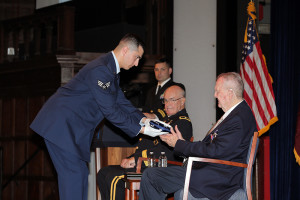 Ghanbari knows how something as important as an award like the Soldier’s Medal and the paperwork for other medals can get overlooked during a war time period.
Ghanbari knows how something as important as an award like the Soldier’s Medal and the paperwork for other medals can get overlooked during a war time period.
“He wasn’t alert when the Purple Heart and first Bronze Star were awarded to him in 1945,” said Ghanbari. “He found out about them when he woke up and found them pinned to his pillow in the hospital. Frankly, that happens quite a bit. When I was in Afghanistan, I saw our troops receive Purple Hearts that were in comas, unconscious or on life support. Often a soldier has no recollection of receiving these awards.”
After meeting with the Perry family, Ghanbari went into action to make sure this hero received the appropriate recognition. He asked for copies of the paperwork that Perry had and followed up the Army awards branch. Following discussions, they agreed to reissue the certificate and award for the Soldier’s Medal but they also issued his Purple Heart certificate and the correct version and paperwork for his Bronze Star.
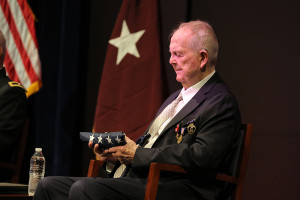 “My initial thoughts were that we had to do something to present him the Soldier’s Medal because it’s the right thing to do even if it is 70 years late,” said Ghanbari. “Because he was not conscious when receiving his Purple Heart and Bronze Star, we wanted to pin all three of the medals that he received in WWII on him at the celebration.”
“My initial thoughts were that we had to do something to present him the Soldier’s Medal because it’s the right thing to do even if it is 70 years late,” said Ghanbari. “Because he was not conscious when receiving his Purple Heart and Bronze Star, we wanted to pin all three of the medals that he received in WWII on him at the celebration.”
Ghanbari organized an event that was held at the Doermann Theatre in University Hall to recognize Sgt. Perry and award him with the medals. The event was attended by almost 100 people including Perry’s wife, along with many members of his family, college fraternity brothers, student veterans, members of the ROTC, and faculty and staff who worked with Perry over the years.
Ghanbari arranged for Lance Talmage, M.D. professor and interim chair, Department of Obstetrics and Gynecology to act as the presiding officer at the ceremony. Talmage, retiring from the Army as a one-star General, is one of the most senior military officials locally and Ghanbari knew he was a close friend of Perry.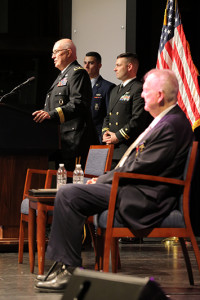
“It was a great honor to receive the medal,” said Perry. “The day itself was a great affair wonderfully put on by Lt. Ghanbari. The people who were there were just marvelous. I enjoyed it very much.”
Perry’s story and the celebration honoring him made the local news on TV and in newspapers. It was a touching tribute that really celebrated the bravery of this hero.
“I just wondered how all of this could be happening after 70 years,” said Perry. “The enormity of being recognized for just doing what a soldier does. I felt it such a privilege in serving the nation as a soldier. It was a great privilege to defend the constitution and, in a small way, stand for principles that no other nation has ever been able to put together to benefit its people. I just felt blessed. I was blessed to be able to serve.”






